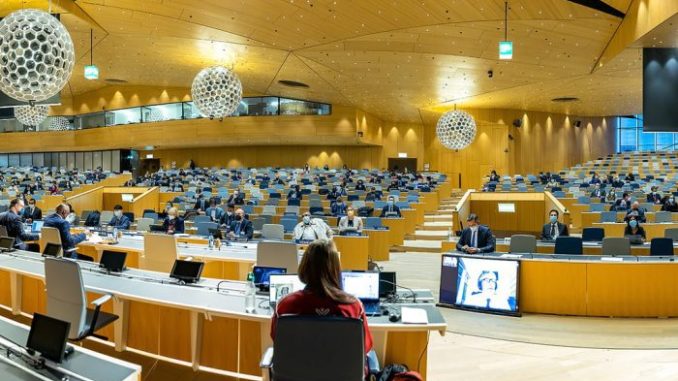

February 18-March 4, 2022, NARF participated in the 42nd Session of WIPO’s Intergovernmental Committee on Intellectual Property and Genetic Resources, Traditional Knowledge and Folklore in Geneva, Switzerland.
This week on behalf of the National Congress of American Indians (NCAI), Native American Rights Fund (NARF) Staff Attorney Sue Noe joins fellow advocates in Geneva, Switzerland urging for the protection of Native peoples’ intellectual property rights through a new international legal instrument. The negotiations are happening at the World Intellectual Property Organization (WIPO), a specialized agency of the United Nations, which provides a forum for negotiating international intellectual property law treaties. The United States is one of WIPO’s 193 participating governments.

Native American Rights Fund (NARF) Staff Attorney Sue Noe joined fellow advocates urging for inclusion of Native peoples’ legal needs in discussions and decisions on intellectual property in Feb. 2022.
In 2000, WIPO created the Intergovernmental Committee on Intellectual Property and Genetic Resources, Traditional Knowledge and Folklore (IGC) to engage in negotiations to develop one or more legal instruments for the protection of Indigenous Peoples’ traditional knowledge, traditional cultural expressions, and genetic resources.
“The negotiations at WIPO are just one prong of Native peoples’ ongoing struggle to secure legal protections for their cultural heritage, in this case intangible cultural heritage in the form of traditional knowledge, like plant and medicinal knowledge, and traditional cultural expressions, such as songs, dances, ceremonies, and stories,” said Noe. “As recognized in the UN Declaration on the Rights of Indigenous Peoples, Indigenous Peoples have the right to maintain, control, protect, and develop their cultural heritage, traditional knowledge, and traditional cultural expressions, as well as their intellectual property rights over the same. And the countries who are members of WIPO have the obligation to ensure that these rights are fulfilled.”

Frank Ettawageshik also participates in the WIPO IGC negotiations on behalf of NCAI.
In 2016, NCAI passed a resolution calling for government-to-government consultation on intellectual property issues as the U.S. participated in the WIPO IGC negotiations. NARF on behalf of NCAI participates in the WIPO negotiations as part of an international Indigenous Caucus, which in the current session is made up of around a dozen Indigenous representatives. This round of the WIPO IGC negotiations is taking place May 30 through June 3, 2022.
The post Advocating for Protection of Native Intellectual Property Rights appeared first on Native American Rights Fund.

February 18-March 4, 2022, NARF participated in the 42nd Session of WIPO’s Intergovernmental Committee on Intellectual Property and Genetic Resources, Traditional Knowledge and Folklore in Geneva, Switzerland.
This week on behalf of the National Congress of American Indians (NCAI), Native American Rights Fund (NARF) Staff Attorney Sue Noe joins fellow advocates in Geneva, Switzerland urging for the protection of Native peoples’ intellectual property rights through a new international legal instrument. The negotiations are happening at the World Intellectual Property Organization (WIPO), a specialized agency of the United Nations, which provides a forum for negotiating international intellectual property law treaties. The United States is one of WIPO’s 193 participating governments.

Native American Rights Fund (NARF) Staff Attorney Sue Noe joined fellow advocates urging for inclusion of Native peoples’ legal needs in discussions and decisions on intellectual property in Feb. 2022.
In 2000, WIPO created the Intergovernmental Committee on Intellectual Property and Genetic Resources, Traditional Knowledge and Folklore (IGC) to engage in negotiations to develop one or more legal instruments for the protection of Indigenous Peoples’ traditional knowledge, traditional cultural expressions, and genetic resources.
“The negotiations at WIPO are just one prong of Native peoples’ ongoing struggle to secure legal protections for their cultural heritage, in this case intangible cultural heritage in the form of traditional knowledge, like plant and medicinal knowledge, and traditional cultural expressions, such as songs, dances, ceremonies, and stories,” said Noe. “As recognized in the UN Declaration on the Rights of Indigenous Peoples, Indigenous Peoples have the right to maintain, control, protect, and develop their cultural heritage, traditional knowledge, and traditional cultural expressions, as well as their intellectual property rights over the same. And the countries who are members of WIPO have the obligation to ensure that these rights are fulfilled.”

Frank Ettawageshik also participates in the WIPO IGC negotiations on behalf of NCAI.
In 2016, NCAI passed a resolution calling for government-to-government consultation on intellectual property issues as the U.S. participated in the WIPO IGC negotiations. NARF on behalf of NCAI participates in the WIPO negotiations as part of an international Indigenous Caucus, which in the current session is made up of around a dozen Indigenous representatives. This round of the WIPO IGC negotiations is taking place May 30 through June 3, 2022.
The post Advocating for Protection of Native Intellectual Property Rights appeared first on Native American Rights Fund.
